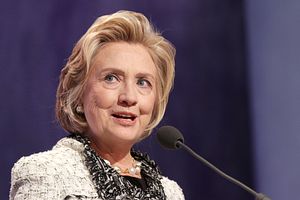Now that Hillary Clinton has announced her decision to run for the presidency of the United States in 2016, the interesting question for Sino-U.S. relations is would her success mean a tougher U.S. approach to China?
Many Chinese pundits and netizens seem to be worried about such a possibility. The Global Times did an online survey asking Chinese netizens’ about their views of Hillary Clinton and 95 percent of the respondents had negative views of her. Because the Global Times and its readers tend toward the more nationalistic and patriotic end of the spectrum, we should not take this result at face value. Nonetheless, many others (here and here) in China share these negative views toward Clinton.
Why is this so? Is this a fair perception of Clinton? Regardless of the accuracy of such views, three main reasons have been cited to support the negative view of Hillary Clinton.
First, it is about Clinton’s past attitudes toward China. While still the first lady, Hillary Clinton had some tough words for China when she attended the fourth world conference on women in Beijing in 1995. That unhappy memory still lingers on the minds of many Chinese. Then again, recently Hillary strongly criticized China for arresting five women for promoting women’s rights. And then, of course, Chinese officials and scholars did not appreciate her interference in China’s disputes with other Asian countries in the South China Sea. Many in China also acknowledge the United States’ pivot to Asia – or rebalance – strategy as Hillary’s brainchild, for better or worse. So most Chinese experts have concluded, perhaps correctly, that Hillary Clinton is a strong leader who would do everything possible to maintain American hegemony in the world, a goal increasingly at odds with China’s growing geopolitical desires.
Second, if elected, Clinton’s party, the Democratic Party, is traditionally strong on issues like human rights and trade protectionism. Chairman Mao once said jokingly that he would any day prefer to deal with the Republican Party, and that might still be the case of Chinese leaders today. Again, this might be a misperception because the Republican Party is also known for its tendency to flex America’s military muscle, something China wouldn’t prefer. So it remains to be seen whether another Democratic president would act tough on China.
Third, and perhaps most importantly, there is increasing tension between China and the United States from a structural point of view as China continues to grow stronger economically and militarily. China will demand more power and respect from the United States, and the United States will refuse to give in as long as it can sustain the current global system. Such structural tensions will not disappear if both sides cannot find an effective way to narrow their differences, manage their conflicts carefully, and eventually share power in Asia. It is in this sense that the person to assume the next U.S. presidency probably matters very little. Whether or not the next U.S. president will adopt a tougher approach toward China very much depends on the capabilities and intentions of the United States as a whole. A single individual, even someone as powerful as the U.S. president, might not have a large enough influence on the democratic and fragmented U.S. system to cause real change. Many in China tend to neglect the influence of the U.S. Congress on American foreign policy, but, in reality, Congress can have a huge impact on U.S. foreign policy. It seems that the Republican Party will continue to dominate the Congress in near future, thus putting more constraints on a Democratic president.
In the end, the attitude Hillary Clinton, if elected, would adopt toward China is a result of all three factors mentioned above. The bad news, however, is that all three factors seem to converge and point to a more turbulent relationship between China and the United States.
This is not inevitable, of course. If both sides work hard enough to establish a “new type of great power relations,” then things will be calm and cooperation can prevail. History has proven that wise politicians can adapt swiftly to new political realities, evidenced by former President Bill Clinton’s about face toward China in spite of his harsh comments toward Beijing during his campaign. Hillary Clinton is, no doubt, a wise politician. As a result, she could actually positively contribute to a more mature and healthy bilateral relationship between the United States and China.

































